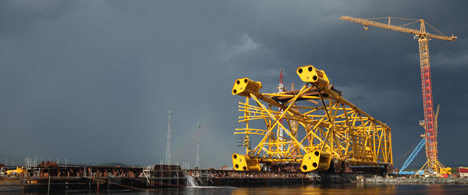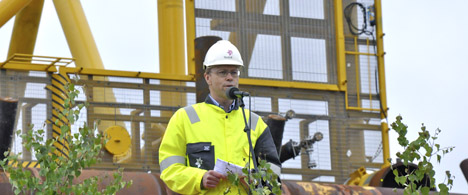
The steel jacket for the Gudrun platform was named at Kværner Verdal on 22 June. (Photo: Anette Westgård)
The champagne bottle splashed “holy” water from the Ol spring over bright yellow steel when it was broken during the traditional naming ceremony at the yard.
Performing this deed was Jørgen Suul, a Kværner Verdal employee who had proposed the name Idun for the structure.
“Today’s ceremony marks an important milestone on the way to starting production in 2014,” says Anders Opedal, senior vice president for projects in Statoil.
Discovered in 1974, Gudrun has had to wait for 40 years before being converted from find to producing field.
“We’ve take a long time to understand this reservoir, which is complex and demanding,” explains Jan Einar Malmin, Statoil’s venture manager for the field.
With high pressure and temperature, the formation still hides secrets. Its name can actually mean “hidden knowledge” in Old Norse.
The plan for development and operation (PDO) estimates recoverable reserves at 132 million barrels of oil equivalent – but this figure is by no means set in stone.
Systematic work will be needed to reach it, says Malmin. “The gap between the highest and lowest forecast is unusually wide in Gudrun’s case.”
New technology, greater knowledge of the area and re-use of existing offshore infrastructure have finally made it possible for Statoil and partner GDF Suez to develop the field.
“This is an important milestone in the project for meeting the target of a production start-up on 2014,” says Carl Otto Hauge, head of non-operated licences at GDF Suez.
“Gudrun is a very important project for us, and underscores our presence on as well as our long-term commitment to and investment on the Norwegian continental shelf.”
To maximise Gudrun’s value, the project team is pursuing two main strategies – tackling sub-surface uncertainty and securing future production, and reducing development costs.
“Cost efficiency and secure development are goals for all our whole portfolio,” says Opedal. “With our strong focus on costs and time, good planning and ownership of these plans are crucial.”
And Gudrun is on schedule, he notes. “We’d planned to name the jacket at the end of June. That’s now been done, and the structure will soon be towed out to the field.”

Terje Masdal, project manager for the Gudrun facility, praised the yard for delivering the jacket on time despite delays in delivering materials along the way. (Photo: Eva Sleire)
Gudrun in brief
|